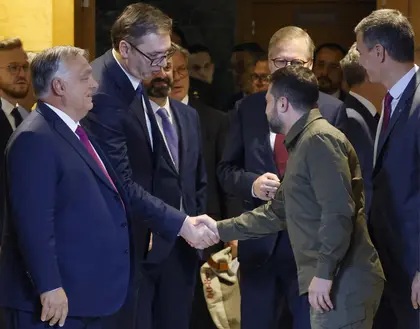Russia did everything it could to make the peace conference on Ukraine in Switzerland pointless and sabotage it. It invested everything it had of the little remaining international credit to make the conference in Bürgenstock resort a failure. The desperate attempt by Vladimir Putin himself to present a so-called “peace plan” just a few days before the meeting in Switzerland shows how much Russia cared about this, although in reality it was a list of Moscow’s conquest goals.
Russia succeeded in persuading China not to send a representative to Switzerland. This was a success, given that Beijing had already participated in a similar format in Saudi Arabia last August. However, Moscow will pay a high price to Beijing for this concession for a long time to come.
Russian diplomacy’s efforts to torpedo the conference in Switzerland did not bypass Serbia. Moscow undoubtedly expected that Belgrade would not attend the peace conference. And even in their darkest premonitions, they did not expect Serbia to sign the final document.
Paradoxically, the anti-Russian hawks in Europe had very similar expectations of Serbia. This is a relatively small but influential circle of so-called “experts on the Balkans,” consisting of analysts and researchers who have made careers (and money) by repeating stereotypes about Serbia’s endless loyalty to Russia for decades.

Serbia and Ukraine are Closer than it Seems
It will be difficult for both to accept that Serbia took part in the conference at the level of the foreign minister. And it will be even more difficult for them to “digest” the fact that Serbia is one of the 80 countries among the 100 or so participants who signed the final declaration, which clearly states that a territorially complete Ukraine is a prerequisite for any peace agreement with Russia.
Moscow will find it extremely challenging to accept Serbia’s support for Ukraine at a conference Russia has labelled as a pointless spectacle by the West and Kyiv. However, Serbia’s Western critics will find it equally challenging, as Serbia’s decision does not align with their long-standing stereotypes, for which they have lacked solid evidence for some time.
The Washington Post has correctly assessed that some countries did not sign the final document because they might have hesitated “so as not to rankle Russia.” But that is not the case with Serbia. It did not hesitate to participate at the conference or to stand behind the final document, together with Ukraine, the US, EU and NATO member states, with 80 countries that strongly support Ukraine’s sovereignty and its right to defend itself against armed aggression.
Anyone who even vaguely follows Serbia’s behavior toward Ukraine since the start of Russian aggression can easily see a solid continuity of state decisions condemning the aggression, demanding Russia’s withdrawal, and protecting Ukraine’s sovereignty and territorial integrity (including Crimea).
Since Feb. 24, 2022, Serbia has endorsed such a policy in a long list of forums and decisions: in four UN General Assembly resolutions, as part of the overwhelming majority of UN members, and then by voting for Russia’s expulsion from the UN Human Rights Council in April 2022. Together with nine other countries in Southeast Europe, Serbia issued a statement last February stating that the aggression against Ukraine is a serious violation of international law and the greatest threat to European security. Serbia’s support for the peace conference in Switzerland, expressed through its participation and adoption of the final declaration, is only the latest in a series of decisions that unequivocally show that Serbia stands by Ukraine and its people in the international arena as an ally and sincere friend.
However, this support extends beyond Serbia’s involvement in the collective efforts of the democratic world to halt Russia’s military campaign against Ukraine. Since the first day of the war, Serbia has provided direct and bilateral support, welcoming thousands of Ukrainian refugees and sending humanitarian aid, including electrical equipment, during the destruction of Ukraine’s energy systems. Last March, Belgrade’s direct financial aid to Kyiv totaled $32.4 million, which was difficult to understand not only for arrogant Moscow but also for Serbia’s fierce critics in the West, who, for no reason at all, continue to make the mark of equality between Russia and Serbia.
Not to mention the Pentagon’s reports that Serbia, as a respectable producer, has been supplying Ukraine with much-needed artillery ammunition, albeit via intermediaries from third countries.
And to complete the puzzle, the first ladies of Ukraine and Serbia, Olena Zelenska and Tamara Vučić, have recently endeavored with their multi-day meeting and humanitarian work in Belgrade, as a continuation of their meetings in Kyiv last September. The first ladies, seemingly in the shadow of their husbands, have been in close contact since the start of Russian aggression. Their work has led to a number of humanitarian actions, such as the delivery of ambulances to hospitals in Kharkiv and Cherkasy.
However, this will not please everyone in Moscow, and unfortunately, it will not please some in Europe either. The former will remain trapped in the myth of historical brotherhood, which in Russian interpretation means the colonial subjugation of Serbia. The latter will refuse to acknowledge the error of viewing Serbia for years through a lens imposed by Moscow. However, this does not necessarily imply a negative outcome. Serbia and Ukraine are well aware that they have shaped their relations according to their own standards as strong partners in difficult times.
The views expressed in this opinion article are the author’s and not necessarily those of Kyiv Post.
You can also highlight the text and press Ctrl + Enter






